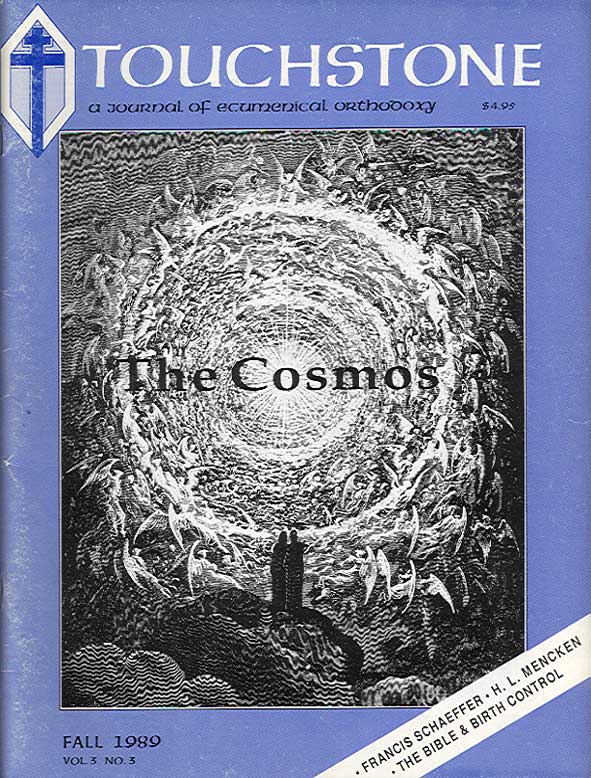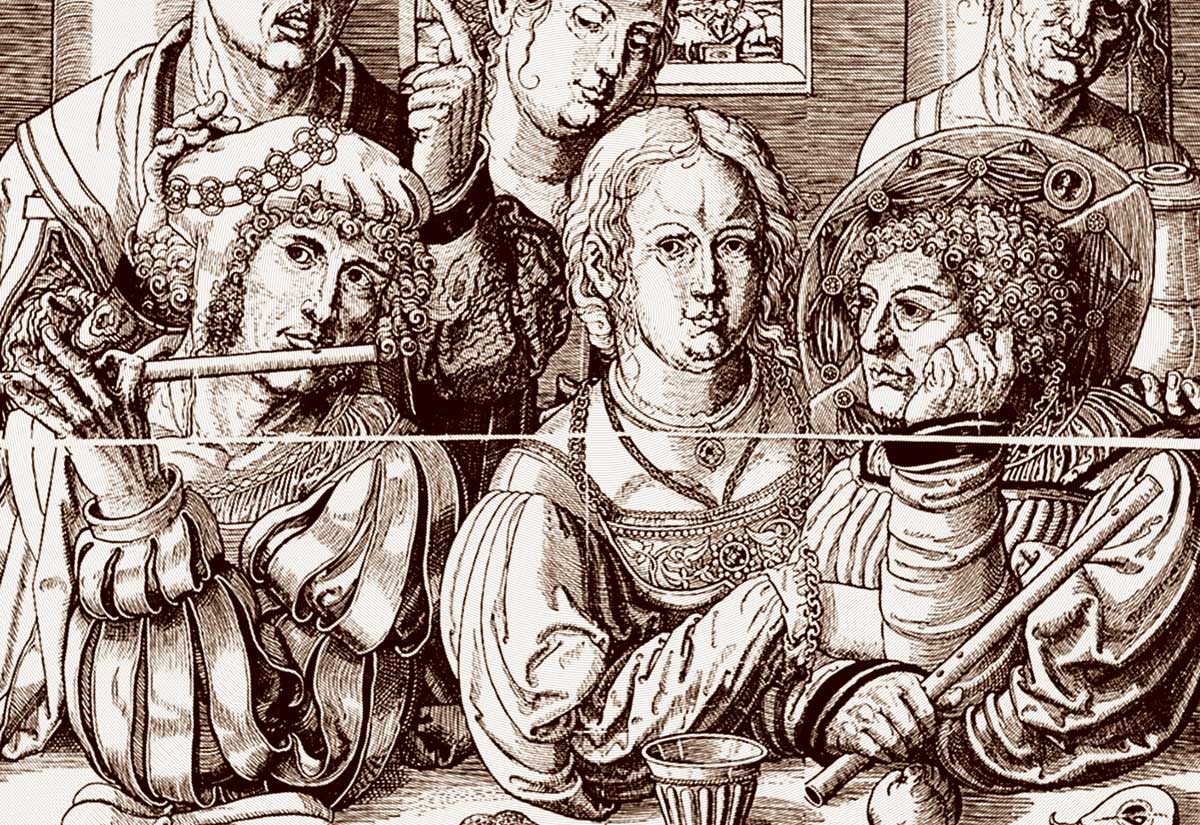Feature
To H*L with Mencken
“If I hate a class of men in this world, it is evangelical Christians. . . .”
Mencken is best known as the Monkey Man who made an Ass out of William Jennings Bryan. He used the Scopes trial to sucker punch the dullard Fundamentalists and opened their unexercised leadership to a public humiliation. An ornery, self-satisfied curmudgeon, Mencken spit his willful poison at do-gooders of every stripe. Progressives, vice crusaders, rotarians, Methodists—you name it; just find a proper noun, and Mencken mocked it. He judiciously bestowed his witty prejudices and put-downs for the public admiration of lesser men: for the unter-mencken, so to speak, who fill the world.
Of those folk Mencken did not have a very high opinion. Mencken’s In Defense of Women describes the male of our species as being peasantlike, a mountebank, a puerile ego, doltish, a booby, a petty rogue, an ignoramus, a poltroon, a popinjay, a blackguard, a knave, shoddy and preposterous, full of loathsome clumsiness in l’amour, a cock on a dunghill. He didn’t think much of women either. But for the grace of Evolution, he was Mencken; and for him that made all the difference.
Henry Louis Mencken was born in 1880. He lived a life of splenetic journalistic outbursts. He wrote for the Baltimore Herald and the Sun papers; edited with George Nathan The Smart Set and The American Mercury; suffered a silencing stroke in 1948 and met his Maker in January of 1956. He was neither a pleasant nor an admirable man, but he was a man gifted with an extremely sharp wit. Annoyed at a world he did not create, he railed against much.
Of especial import to the Christian reader was Mencken’s blasphemy; a minor point to modernists, it is an essential peg by which the orthodox nail Mencken into the critical place reserved for fallen journalists. Mencken delighted in iconoclasm, blasphemy, irreverence, and irritating the pious with his tweek-nose arrogance. As a child he probably made coarse noises during Reverend Bauer’s sermons. As a grown man he loosed equally infantile comments like these:
• “The more, indeed, the theologian seeks to prove the wisdom of God by His works, the more he is dashed by the evidences of divine incompetence and stupidity.”1
• “The essential feminine machine is no better than the essential masculine machine; both are monuments to the maladroitness of a much over-praised creator.”2
• “The first-rate man is an admirable creature; his qualities are appreciated by every intelligent woman; as I have just said, it may be reasonably argued he is actually superior to God.”3
• “Show me a Puritan and I’ll show you a son-of-a-_____.”4
• “If I hate a class of men in this world, it is evangelical Christians, with their bellicose stupidity, their childish belief in devils, their barbarous hoofing of all beauty, dignity and decency.”5
• “The Christians of the Apostolic Age were almost exactly like the modern Holy Rollers—men quite without taste or imagination, whoopers and shouters, low vulgarians, cads.”6
Mencken was no friend of the faith. He was a self-educated intellectual who had read too many German philosophers and found himself in an arrested state of spiritually rebellious adolescence. Like a schoolboy who cannot refrain from boasting, he danced before the class, displaying his learning in torrents of sneering condescension and showing off by dropping German phrases. It was a schrecklicheit here, a schapiskopf there, and a slaughtering of sacred cows everywhere. Mencken was the cranky village atheist who had gathered a national audience.
What can the Christian reader benefit from a cantankerous fellow such as this? Perhaps more than one would at first think.
Spiritual Skepticism
Mencken’s greatest gift to the Church is skepticism. It is not the most pleasant of gifts, but for fallen human beings it is an essential one. Skepticism is the unwelcome reminder that we are all a bunch of sinning clods. And a little skepticism might have saved us from any great embarrassment over the recent televangelist scandals. With power, wealth, and fame unchecked by accountability—what did we expect? People who have an understanding of human sin, however, are never surprised at its manifestation. Skepticism is a swig of reality to a world athirst for honesty.
Skepticism is also objective in its critique: it has many axes to grind, not just one. On the one hand, skeptics can often be the storm troopers of the right; they pillage through the dreamy utopian’s village—dousing idealism’s hearth flame wherever they find it. On the other hand, they are the mercenaries of radicalism, upsetting the quiet villages of Pastoral Prejudice. True skeptics will stomp on anybody’s toes. Tory or Jacobin, they’re all jackasses to a skeptic. Skeptics just love stomping on things.
But skepticism has its moral limitations. It can develop into hard-core cynicism. Cynicism is always half-right. It always sees that man is a stupid sinner, and always points out his preposterous pride. It can go no further. Cynicism, unlike satire, does not aim at moral corrective. Satire is a literary form which castigates vice and goads to virtue. Its object is moral corrective. Cynicism, on the other hand, does not improve the object nor heal the victim. Possessed alone, without some charitable virtue, it festers into a form of pride, a moral degeneracy: intellect without love. A satirist is the type of fellow who draws political cartoons, but a cynic scribbles on toilet stalls. Not having any basis for right and wrong, the cynic can never rise to the level of fighting for something, though he never lacks something to fight against.
Cynicism usually affects those with a high enough intelligence to realize that most people are not altogether morally or intellectually honest. It is a period of superciliousness, a smirking recognition that Mr. Carpenter the history teacher pronounces his Latin wrong or that the Reverend Williams has been known to let his eyes wander to more than curving sand hills at the beach.
Cynicism therefore is an ugly sneer at the human condition. Usually the sneer is deserved. Yet it is dark humor without humility; it is sarcasm without the self-immolation of the soul. Cynicism allows one to see the evil side of every event or man, but it is blind to providence or redemption.
Christian skepticism must lead to Christian satire; it is the only way that skepticism can be redeemed.
More to Mencken
The Christian reader will feel little call to Mencken as mentor; nevertheless, I think there are other things we can learn from his strength and errors.
First, I am afraid that Mencken presents us with a negative example of what sin can do to a soul. Consider the wit of Mencken versus the humor of a Muggeridge. Both men hated evil; but Muggeridge also loves the good: it makes the world of difference. Rough and tumble conservative Christians of the polemics division ought to learn from Mencken that a vile tongue is a nice tool—but a corrupting one. Pulpit-pounding is no substitute for visiting the sick. And a mocking castigation of a new Christian Left airhead may bring neither spiritual development to the empty brain-drum which receives the blow nor to the word wizard who delivers it. We must make a distinction between the cynicism of Satan and the sarcasm of Christ. And the difference is charity.
Secondly, Mencken, like the great misanthropic writers of the 18th century, reminds us of the artistry that can be made from the foolishness of man. Invective can be a legitimate tool of art, just as sarcasm can be a fair device for satiric literature. In mastering this genre, Mencken displays a sense of highest literary performance. With hands behind his back, and with serious demeanor, he parodies the archetypal teacher. He is a highbrow stand-up comedian who mixes formal style, slang, paradox, jargon, and sixty-four-dollar words to describe the fearsome ugliness behind the most trivial acts of man—from brushing one’s teeth to kissing one’s wife.
Thirdly, Mencken reminds us of the power and beauty of language. And it was as a self-made philologist that Mencken had his greatest success, cataloging in The American Language the fertile development of New World English. Mencken’s success came from coupling his vast vocabulary with his clear, spritely, half-cocked style. We see a similar semantic erudition in writers like William F. Buckley, Jr., while the caustic Mencken tradition is kept alive by the frolicsome R. Emmett Tyrrell, Jr. of the American Spectator. Following Mencken’s lead would aid in the revivification of English-speaking journalism, and it would put the punch back into the Christian prophetic tradition. Of course, the kind of folk that Christians would lambast would bear a doctrinal affinity to Mencken.
Fourthly, there is certainly something to be said for debunking false gods. Elijah enjoyed a few good shots at the priests of Baal. And Jesus was not light-handed against the hypocritical Pharisees. We need corrective visions for any false idealism: religious or secular. Mencken the Blasphemer reminds us that we are often too tolerant of false deities and their devotees. We need someone to burst the bubble of our ideological fixations: both of the Right and the Left. The only problem is that Mencken can’t tell blood from tomato juice when it comes to deities. The Christian writer, having presumably a better understanding of what a false god looks like, ought to have a field day with the modern world.
Fifthly, the Scriptures teach that bad company corrupts good morals. And it is interesting to see the kinds of authors that Mencken refers to with respect: Havelock Ellis, Bernard Shaw, Friedrich Nietzsche, Herbert Spencer, and Ibsen. Mencken’s reliance on Nietzsche, the champion of the ego and will, especially encouraged his own vice of pride. And most certainly, a steady diet of Mencken would poison a reader’s soul. I am not suggesting from this that we suppress, ignore, or fail to read men like Mencken. I agree with Milton that we are to “see and know and yet abstain” from the falsehoods we encounter. Still, we are reminded of the divine precept that a tree brings forth fruit after its nature. It is imperative therefore that we search out the genealogy of good men, and that we join their literary company. Mencken gives us an example of those who have taken the opposite course.
Behold the Mencken!
The Bible tells us of the Apostle Nathaniel, a man whom Christ described as “an Israelite in whom there was no guile.” The result of this lack is a kind of hardnosed upfront realism about life, a quality, when coupled with a virtuous heart, produces excellent, and probably very humorous apostles. H. L. Mencken can be fairly described as a writer in which there was too much bitter cunning, too much intellectual conceit, too much brooding bile. He was a faithless man, and therefore a man who did not trust the things of the heart or any sentiment, including proper sentiment: “If I knew what was true,” said Mencken, “I’d probably be willing to sweat and strive for it, and may be even to die for it to the tune of bugle blasts. But so far I have not found it.”7
Like the murderer in Chesterton’s Father Brown story, The Hammer of God, he had dwelt too long looking down on people from his cathedral loft: he had begun to see them as ants, things to be stepped on. He never imagined himself as a worm, something that needed to be saved.
When Mencken died they certainly should have given his spleen to science. His soul, poor fellow, was in Greater Hands. •
James L. Sauer, Contributing Editor, is Director of Library at Eastern College, St. Davids, Pennsylvania.
James L. Sauer is the Director of Warner Memorial Library at Eastern College in St. Davids, Pennsylvania. He and his wife, Paula, live in Coatesville, Pennsylvania with their seven children.
subscription options
Order
Print/Online Subscription

Get six issues (one year) of Touchstone PLUS full online access including pdf downloads for only $39.95. That's only $3.34 per month!
Order
Online Only
Subscription

Get a one-year full-access subscription to the Touchstone online archives for only $19.95. That's only $1.66 per month!
bulk subscriptions
Order Touchstone subscriptions in bulk and save $10 per sub! Each subscription includes 6 issues of Touchstone plus full online access to touchstonemag.com—including archives, videos, and pdf downloads of recent issues for only $29.95 each! Great for churches or study groups.
Transactions will be processed on a secure server.
more from the online archives
calling all readers
Please Donate
"There are magazines worth reading but few worth saving . . . Touchstone is just such a magazine."
—Alice von Hildebrand
"Here we do not concede one square millimeter of territory to falsehood, folly, contemporary sentimentality, or fashion. We speak the truth, and let God be our judge. . . . Touchstone is the one committedly Christian conservative journal."
—Anthony Esolen, Touchstone senior editor









